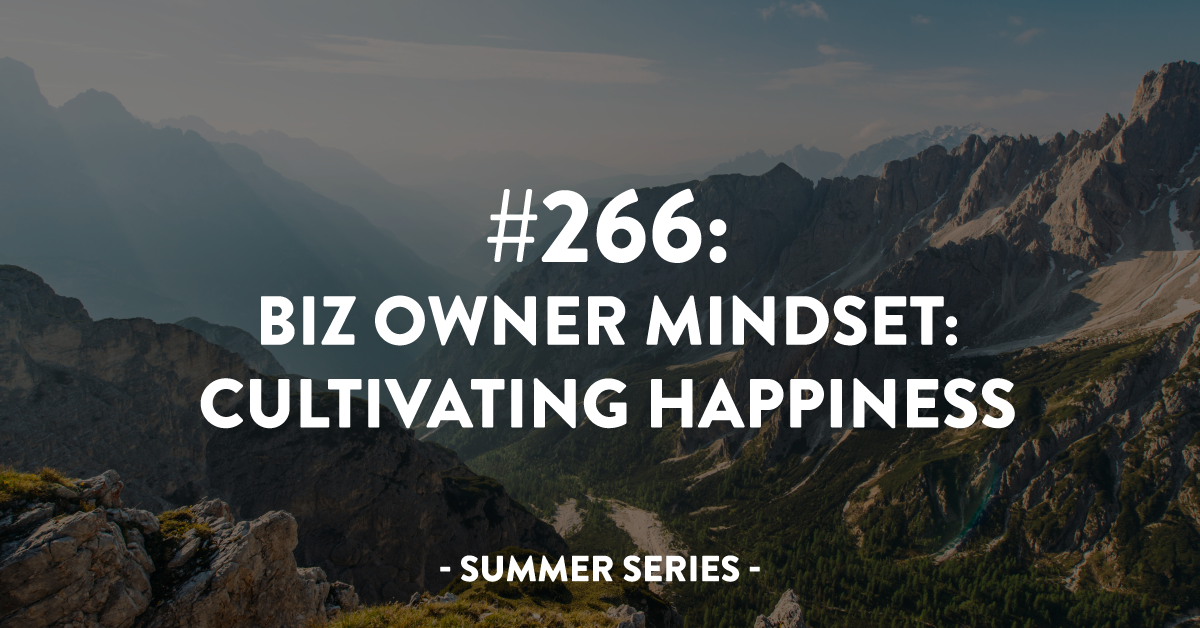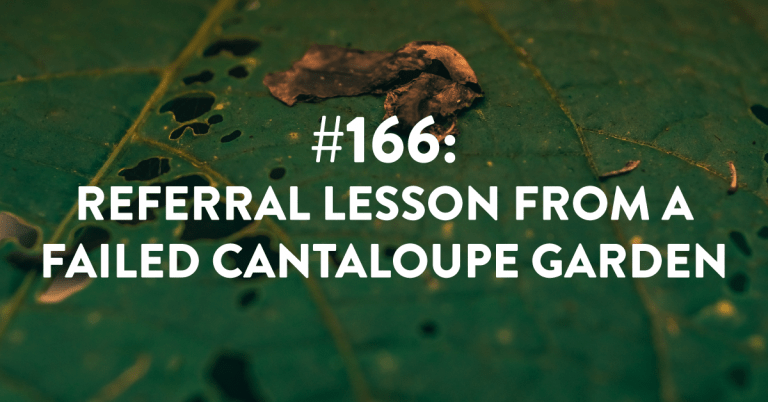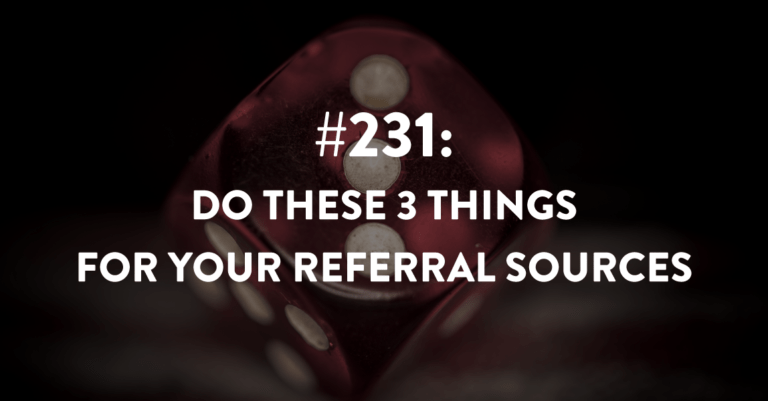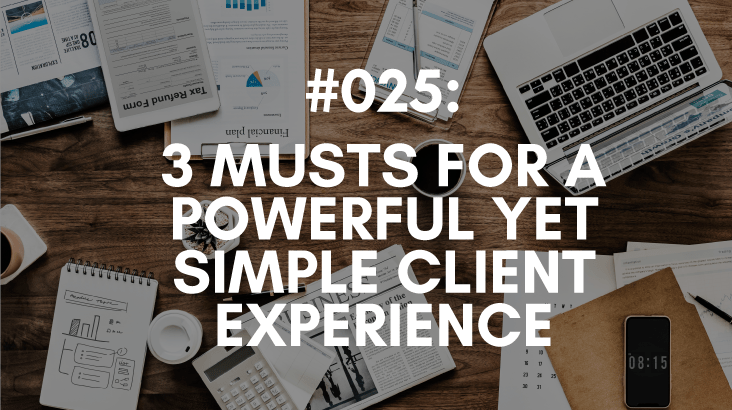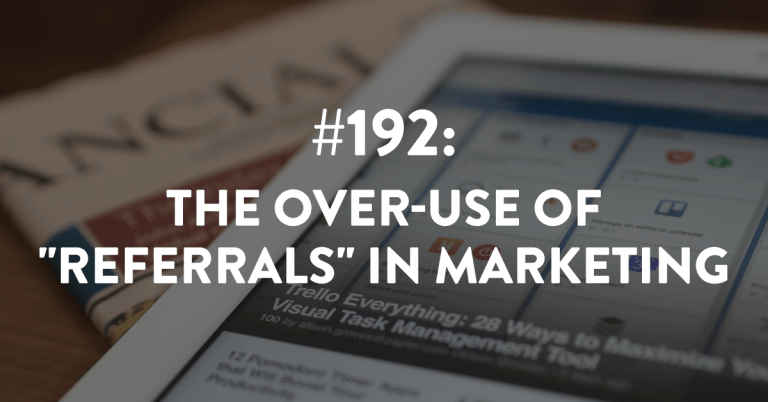Ep #266: Biz Owner Mindset: Cultivating Happiness
Dr. Ellen Wong, ND, Chief Happiness Officer, and speaker, joins the show to discuss cultivating happiness. Our conversation centers around the importance of happiness in one’s life, highlighting that it should be the ultimate goal for everyone. Often, we mistakenly believe that happiness will come after achieving a particular milestone or reaching the pinnacle of success. However, Dr. Wong encourages us to challenge this notion, emphasizing that true happiness cannot be found by constantly seeking external achievements.
Listen in as Dr. Wong introduces the concept of the “9 Pillars of Happiness.” Each pillar represents a fundamental aspect that contributes to our overall happiness, and by paying attention to these pillars and aligning our lives accordingly, we can cultivate a lasting and fulfilling sense of happiness.
Links Mentioned During the Episode:
Learn More & Get in Touch with Ellen Wong:
Download Ellen’s 9 Questions To A Happier Life
Is it time to get serious about joining Building a Referable Business™ (BRB)? First step is to submit your application BRB to see if you’re a fit.
Next Episode:
Next episode is #267, and the summer series of the business owner mindset continues!
Download The Full Episode Transcript
Read the Transcript Below:
Stacey Brown Randall: When this question was posed, I was surprised by its simplicity, yet taken aback by the fact that until now, this question hadn’t really had an answer. So, what is that question? Well, we’re going to get into it in this episode.
Hey there, and welcome to episode 266 of the Roadmap to Referrals Podcast, a show about helping you build a referable business.
My journey from business failure to a successful business now 10 years in, I know generating referrals naturally and consistently has made all the difference. Working with clients around the world, we leverage the science of referrals plus protecting relationships above all else to help you build a referable business.
Welcome back to another episode. I’m your host, Stacey Brown Randall.
It’s really sad for me to say, but we are winding down our summer series. Yes, this episode and the next one, and we’ll be calling it done for the 2023 summer series focused on the mindset of a business owner.
But we’re not done yet, and I am very excited to say we’re not done yet, because we need to talk to Dr. Ellen Wong first before we do anything.
And that of course, is what today’s interview is all about with Dr. Ellen Wong, is that tease I had for you in the beginning about the question; what is that question that actually doesn’t have an answer? It’s shocking and intriguing, and surprisingly simple.
Well, I’m not going to spoil it for you. We’re going to talk about it, don’t worry. Ellen and I are going to dive into it. But first let me tell you a little bit about who Ellen is.
Ellen is the Chief Happiness Officer. That’s right, I love her title. Her learnings are based on the work of professors at UC Berkeley, Yale, and Harvard along with her travels to the happiest countries in the world.
#Life goals. That’s my point.
She is the Doctor of Naturopathic Medicine, an industry leader in high functioning anxiety. She’s a recovering overthinker, people pleaser and perfectionist (notice I said, recovering on all of those) and of course, she’s a bedtime story reader and cuddle giver as well.
So, let’s dive in to understanding and cultivating happiness with Dr. Ellen Wong.
Ellen, I am so excited to welcome you to the podcast today. This is going to be such a great conversation. I mean, how could it not be? It’s going to be about happiness, so it has to be a happy conversation.
Dr. Ellen Wong: I hope so.
Stacey Brown Randall: And I feel like that’s how it all fits together. But before we dive into the couple of questions that I am dying to ask you and that I want my listeners to understand, why don’t you just start with kind of like a brief overview about yourself and your work.
Dr. Ellen Wong: So, I work as both a naturopathic doctor and a Chief Happiness Officer. And I would really summarize what I do as helping entrepreneurs and leaders prioritize their happiness as much as their success.
Stacey Brown Randall: That is so good, because it’s necessary. So, this whole series that we’re doing right now, this whole summer series is on a topic that is not normal for me to talk about on the podcast.
Dr. Ellen Wong: I thought you were going to stop right there. Just not normal, I’m like, “No, okay.”
Stacey Brown Randall: It’s not normal. We should not talk … I’m just kidding. Totally kidding.
No, but it’s not normal to talk about on a podcast that’s titled Roadmap to Referrals and is all about referrals and business growth, and client experience, to then all of a sudden, be talking about mindset, and specifically the business owner mindset, because that is, the majority of my listeners are business owners.
And they are at all stages and different types of industries. Well, they’re business owners, so we kind of all have the same similar problems, even though we think that they’re unique just to us.
But when I decided to do this series on mindset, you came to mind because I think that it’s something that’s really, really important. And I heard you say this once, and I was like, “This one statement is exactly why I want this to be a part of the mindset series.”
And that one statement you said or the question I guess that you were posing was, “Why have we never been taught to be happy?” Never thought about that before, the answer is just, “Go be happy.” Like you know what I mean? And I was like, “Wow, there’s a whole process behind it and you have a big chunk of your work that is dedicated on this idea of happiness.”
So, tell us more about what’s really packed into that question. The things that people aren’t thinking that they don’t even know they should be considering when it comes to happiness.
Dr. Ellen Wong: So, to me, happiness is probably the most fundamental human desire and goal that we all have. Because if you think about … we’ll talk about business owners in this conversation, but everything that you build your business for, you want to have more impact, you want to have freedom, you want to have income, you want to be able to afford the lifestyle that you want, you want to be able to show your children that they can live their dreams and make a living, and all those things and do good in the world.
Ultimately, if you walk down the path of every one of those goals, every one of those milestones, and ask the question, how would you feel if you were to be able to do all of those things — most people, I think the word “happy” would be in their answers.
I think the thing that then we get caught up in though, is that we think happiness happens after we achieve the milestone. So, happiness is on the other side of success.
It doesn’t really work that way. I think we can all sit here and understand that it doesn’t work that way, but we can geek out about this. There’s like a physiological response in our body, which is when we reach a goal, we get all this dopamine, we’re super excited, we get all these like positive emotions.
And I know every entrepreneur listening to this has felt this. You hit that goal, there’s all these positive emotions, and then positive emotions are really just chemicals in our body.
They dissolve, they disappear, and then we dive into this like abyss of feeling like, “Oh, the next thing I need to do then is therefore, this.” And then like, “I need the bigger launch and I need the bigger numbers and I need the next big thing.”
It’s like the five-figure launch, the six-figure business, then the seven-figure business. And then I got to like do that. There’s always something else, and what that whole process is, is we hit a high and then it dissolves, and our body gets addicted to that high. So, we need to hit the high again.
And if you fall down that path your whole life, what will end up happening is you’ll keep chasing the next thing. And even if it’s not in business, we get told this our whole lives.
You go to school, you get good grades in school. Then you go to a good college or university, and then you find a good job, whatever, like your first job, get a good job. Then you get a promotion, then you’re supposed to meet the right person, then you’re supposed to get married, then you buy the perfect house, then you have your kids, and then your kids have to do well in school.
Society keeps telling you that there’s all these milestones you’re supposed to hit, and we all think that once we hit those milestones, we’ll be happy. And then because the chemicals dissipate, then you need another milestone. And so, forever, our whole life, we’re just chasing the next thing in order to feel happy.
But if you take a look at one of the most … so like highly quoted psychological research studies out there, which is like the top five regrets of the people who are dying — and it was recorded by this palliative care nurse, and she literally just talked to people she cared for and she documented this thing, and they’ve replicated her research several times and it’s the same result.
It’s like the top five regrets are like, “I wish I didn’t work so hard, I wish I didn’t care what people thought and I lived a more authentic life.” And the last one kind of the most impactful one was like, “I wish I had let myself be happier.”
And I remember going through this phase in my life where I was very anxious and very depressed, and it really hit me, it’s like the ultimate goal of every single thing we do is happiness.
The people who unfortunately have regrets on their deathbed is they wish they could let themselves be happier. So, if it is so important, why don’t we talk about it ever?
Stacey Brown Randall: Yeah.
Dr. Ellen Wong: That was not a short answer to your question.
Stacey Brown Randall: No, but it’s so powerful because I think until you unpacked that whole answer, and I’m so glad you brought out the thing about the top five regrets of the dying, because if you hadn’t, I was going to probably make that my follow-up question.
That crystallizes the importance I think of not only your work, but in teeny tiny terms, just this conversation. And this conversation for the listeners is that understanding of like, you don’t want to get to the end of the road and be like, “Wow, just wish I had been happier throughout that journey.”
I don’t know if I instinctively, consciously got myself thinking like this or if I just noticed over time, I did this a few times, and then I was like, “Oh, this is how I am.”
But I have moments every day — maybe not like every, every day, I do have three kids, two teenagers and a preteen. So, let’s be honest, not every, every day. But I will have these moments that kind of take my breath away of my sense of contentment and happiness. And they usually happen on a walk, sometimes while drinking a Starbucks, I will be honest.
Dr. Ellen Wong: Yeah. I’m with you.
Stacey Brown Randall: But just like this moment of like, “Oh my gosh, I love my life.” And we are not the wealthiest, my business is not the “Society’s” definition of the greatest success it could be,. While Norm and I have a very solid marriage and we have three amazing kids, both are not without their trials and tribulations and bumps and bruises along the way.
But it is the sense that I don’t know if I choose it, like I consciously think it, but I feel the sense. And really is usually when I’m on a walk because things are I guess calm and quiet and that kind of stuff.
But I’m just like, “I am just so happy that this is part of my daily routine, or this is how I get to feel today, or this is how I feel.” And sometimes, that happens when I’m driving, but I don’t think everybody has that.
Dr. Ellen Wong: No, and I think you’ve tapped into something and I’m going to potentially misquote this, but it’s along the lines of happiness isn’t getting what you want, it’s wanting what you have. And I think there’s a part of happiness to me and it’s embedded in one of my pillars of my framework, this idea of inner peace.
It’s what you’re describing. You’re going for a walk and you’re just like, “Wow, look at what I’m doing right now, it’s in the middle of the day, I’m going for a walk, I’m surrounded by nature with beauty.”
Or even if you’re in the city, you’re surrounded by something that you like, you chose to live there, you’re holding a cup of coffee, you’re enjoying the sensation of drinking that coffee in a mug that you like.
And I mean, we can dive into like the whole Starbucks thing, but like they designed their cups and their lids and the opening in the whole like a very specific way, a very specific thing. And like-
Stacey Brown Randall: They’re no dummies.
Dr. Ellen Wong: No, they certainly are not. But it’s like just this moment of being present and still in the chaos where you can feel content.
If you are constantly aiming for something and you’re constantly striving for something and you’re constantly in this turmoil and this chaos and you’ve created a life where there’s just tension everywhere, it is very difficult to feel truly happy.
And I’ve had conversations where people who are stuck in that zone and they’re like, “But I am happy, I go on vacation and I’m happy.” Or like, “I go have a meal with my friends and I’m happy.” And I’m like those are all moments of pleasure which is important.
But I think a true sense of happiness, cheesy as it sounds, does come from within and we actually do have the capacity to cultivate it. It’s just in this really fast paced action filled world. We don’t always allow for the presence and the stillness and that inner peace to feel that true sense of happiness and joy. That’s a lot deeper than the sense of pleasure that I sometimes think we get mixed up.
Stacey Brown Randall: Hey there, pardon the interruption. I know, I know, the summer series, it’s all about that mindset of a business owner and I hope you’ve been enjoying it. But it is important to remember not to ignore what you think about referrals and your referral mindset as well.
In our Building a Referable Business Coaching Program, we help you implement not only the right referral mindset, but we also give you the strategies, the individual tactics, and yes, in some cases exactly what to say that you will need to build a referable business.
Go to staceybrownrandall.com/referable to learn about everything you receive inside BRB, and to submit your application. The link again. is staceybrownrandall.com/referable.
Now, back to the interview.
I think that’s great because I don’t think I’ve ever thought about that, the difference between happiness, that inner peace, inner contentment happiness versus like pleasure in the moment because I’m hanging with my friends or I’m on vacation or my kids are actually listening to me, and I want to be around them. My poor kids, they get beat up a lot on this podcast.
And I think that’s really important, and I think for me, it’s the simplicity, and I think that’s come with age. I’ll be really, really honest. I think the craving of that simpler life has definitely come as the kids are getting older and now, we’re looking at only three more summers with the boys before they’re off to college, God willing, and only five more with my daughter, I think — and this is kind of started.
And maybe some of it was triggered by COVID, and the pandemic and the lockdown and stuff, but there’s like craving for simplicity and it’s like noticing those simple moments like out for a morning walk and just like super happy with that moment.
Okay, so we could talk about this forever, but I need to make sure that we give you time to break down at a high level, because if people really want to like dig into each of these nine pillars of happiness, we’re going to tell them at the end where they can go and get all the goodness from you.
But can you just give us like a high level of the nine pillars within happiness, and they actually spell out the word happiness for those who are ultimate note takers if they’re wanting to know. They’re going to spell out the word happiness. So, can you just high-level kind of hit them for us?
Dr. Ellen Wong: Yeah, I can. And just like a quick brief, like why did I come up with these nine pillars? It really came down to like answering that question like, “Well, what actually does it mean to create happiness? What is it actually?”
I try very hard not to use the word “choose happiness” because I was told to choose happiness and I was given the advice to choose happiness, but my biggest peeve around that was like, if I don’t know what to choose from or where to choose from — like choosing means there’s like things in front of me that I can pick, but if I didn’t have anything to pick, then one of my … I just like wrestled with it for such a long time.
And so, throughout my deep dive into happiness … I have a research background, so like a very research perspective and then I sort of traveled to the world’s happiest countries because I wanted to experience. I really wanted to like sit on a park bench and be like, “What does the world’s happiest country feel like if I sit on this park bench?” And like, “How are the people there?” And I really wanted to understand it.
And so, when I combined my sort of academia research versus like this experiential thing, it made me realize that there’s what I call the nine pillars of happiness, which is the sort of the nine things you want to pay attention to in your life if you want to create this true sense of happiness.
Now 100% that there are people listening to this who are perfectionists and they’re going to be like, “How do I get perfect on all nine of these pillars?” And the answer to that is, you cannot get perfect on nine pillars because that’s not the point. If you try to do that, you would just spend your whole life focusing on those things, and then it would probably start to create problems elsewhere.
So, I don’t want anybody to feel like, “Oh my gosh, I’ve got to nail these nine things.” But the way I talk to my clients about this, is that you come back to these whenever you don’t feel as happy as you want, come back to these nine pillars, and think about which of these you want to work on, and you have the capacity to work on because sometimes, it’s a capacity thing and we don’t have the energy to dedicate, and that is okay.
So, as I go through these, if you are kind of contemplating or taking notes or whatever it is; mental notes, actual notes, whatever, think about like, “Oh, this is an area I want to like pay some attention to.” And then look into how you can do that, but don’t try and nail all nine of these. I’ve had people ask me that, like, “How do I get perfect?” I’m like, “You can’t.”
Stacey Brown Randall: This is not your SAT, do not aim for the perfect score.
Dr. Ellen Wong: Okay, so the word “happiness” spells out these pillars and the first one is H, so like health. To me, it’s like health is obviously not just physical health, but like mental health, emotional health, spiritual health, all of the healths in that one word.
The A stands for authenticity, and to me it’s like, are you living the life that you actually want or are you living and pursuing goals that other people have told you you’re supposed to pursue?
Right to your point, Stacey, you don’t have to have the world’s definition of the most successful business to be a happy person. You just need to be aligned with what it is that you do, and it needs to afford you the lifestyle that you actually want, not other people tell you what a successful business owner should want.
And then the first P stands for purpose. Like the things that you’re doing, are they meaningful? Are they fulfilling? Are they having a positive impact?
The next P stands for productivity. I don’t define productivity as trying to do as much as you can in the least amount of time possible. To me, productivity is, do you feel in control of your use of time towards the things that matters to you? That to me, is productivity.
Then the I stands for inner peace, which we’ve already alluded to.
The N stands for nature. Again, like spending time in nature is really important. And it’s like the stillness and that like creating awe in what’s around you.
The E stands for emotional mastery. So, it’s really understanding what are the triggers? What are the negative self-talk? How do we move through it? How do we react to it? How do we respond to it? Things like that. How do we deal with ups and downs of life?
And then the first S is social connection, which is like, do you have present connected meaningful relationships that fuel you?
And then the last S is sustainability. And the way I think about sustainability is yes, from a global level, because I think we do have a responsibility to take care of our surroundings in our earth, but also, from like a personal sustainability perspective, which is like, are you making decisions and choices and actions that you can keep up with?
And if you fill your plate with things that you can’t keep up with, you will eventually not feel happy with what you’re doing. Whether it’s like a personal relationship or like workwise.
Stacey Brown Randall: You know, it’s funny because none of those that you just mentioned was money. None of those was like money or the things or the material things that I think people get caught up in chasing when they’re not paying attention to what they truly want.
And I know for me, I have felt, for years now, feel like I’m unpacking this expectation that I had for my life because life does not go according to plan. I mean, we’re just not that lucky.
And so, but I’ve been unpacking this expectation I had for my life or like how far along I would be and what my life would look like, and right down to how much money would my business be making, and what did our house look like and what can we afford and what can we not afford?
There’s this expectation that I placed, and I think I just layered on it year after year after year, and kept that expectation going. And what I’m finding, and I do know that aging is a part of this, but I don’t think it’s completely about this aging piece.
I think this is just my journey that I’ve also been going on, on the timetable, that I’m on this journey, is me unpacking that and removing some of those layers and being like, “But do I want that?”
Why do I keep finding myself just craving that unhurried lifestyle that can afford a morning walk and an afternoon walk if I want to, and to be at all my kids’ stuff, even if I don’t love the sport they’re playing, and I force myself to watch it. Like with my son’s wrestling, I was like, “This is terrible but I’m here as a mama.” I was like, “I don’t know why anybody invented this sport.”
I know I battle layers of what society told me but then layers of my own expectations, and now it’s like trying to peel those back and be comfortable with that smaller life, that unhurried life, but it’s still yet the beautiful life.
And I think as I get more and more comfortable in that space, it certainly helps me feel more, I’m assuming that inner peace.
Dr. Ellen Wong: Yeah, it was probably last year, I remember seeing this entrepreneur, I follow her on social media and she’s like on her private plane flying somewhere and she wasn’t saying like, “Look at how successful I am.” But in a way, it was like, “I have reached this level of success where I can have a chauffeur meet me at my front door with a limo, drive me to a private airfield, hop on a private jet to fly to do the thing …”
And then I even remember being captivated by it, but then also like just a little while later being like, “Wait, actually, do I want that?” Like for one split second, imagining that I actually made the level of money that I could afford that, is that actually how I would spend the money? And the answer was no.
I don’t know that that would come across my mind as like, “There, now I’m successful, look, I have a limo pick me up.” And there’s no judgment. Like if that is something that you want in your life and that is your level of success, and I say by all means, go for it.
But I would also then say like, just make sure that that’s actually what you want. And if it’s not what you want, that’s totally good too. Like it’s great. And I think it’s what you were saying, it’s like society tells us like that’s what we should want and maybe it’s not what you want.
I just saw somebody else that’s like, “I don’t have parties at homes anymore, I have parties on yachts.” It was another one of those where I’m like, “Wait, if I had a lot of money, do I want to have a party on a yacht? Probably not. I get motion sick anyways, a house is great, thank you.”
Stacey Brown Randall: We need to curate your social media feed.
Dr. Ellen Wong: There’s that too. It makes you think though, there’s like all these things that people show you. It’s like what wealth should be and like what a successful business should look like. I think there’s a lot of people out there who have very successful businesses that can afford them the lifestyle they want because they have actively decided what lifestyle they actually want.
And again, if you want to go on a yacht and a private plane, I say go for it if you’ve examined it and that’s what you truly want. But if you’re caught in the loop of like, that is what a successful business owner should look like, I think you’re going to run into this thing where you’re like, “Oh, I’ve done it but then what’s the next bigger yacht and what’s the next …”
Stacey Brown Randall: This reminds me of a documentary I watched in my twenties, and I don’t remember the documentary, I don’t remember who it was about. It was about some Silicon Valley like mogul, like some tycoon billionaire. And I don’t remember anything other than that.
But what I remembered walking away from was the sense that he had spent all this time at work, he had built this huge company, he made a crap ton of money. And there was a scene in the documentary where they were interviewing his son and his son could not have been any more disappointed in his father.
And the dad was like, “I worked all this hard to make all this money because I wanted to give to my kids and give them everything they ever wanted and they’ll never have to want for anything.” And the son was like, “Why did you even have us if you weren’t going to be around?”
It was like a mental note to my internal subconsciousness of like, “That’s not the parent I want to be.” Like if that means things are smaller and less … I want my kids to be like, “Oh my gosh, my mom was around so much, it was annoying versus she was never around.” That just kind of struck me from that.
Okay, so I am loving this conversation and I hate it when we’re like, “Oh, well, we can’t go on for hours, so we have to like stop.” I know people are going to want to follow up with you.
You have a great downloadable like nine questions people can ask from that perspective, I’ll make sure I get it right — to ask themselves for a happier life. It’s like nine questions, maybe they’re routed to the pillars, I’m not really quite sure, I would make that guess, but look how smart I am. But there’s great information that they can gather from you.
So, why don’t you tell everybody where they can find you and if they want to connect, how do they get in touch with you?
Dr. Ellen Wong: Yeah. So, speaking of social media, I am on social media. I promise you, if it’s triggering, no yachts and no private jets but I do share a lot about, I guess, like things around happiness and success and how do we — balance those isn’t always the right word either, but how do we have both? How do we keep both so that we can get the lifestyle that we want, but then don’t have those regrets at the end of our journey.
So, I’d love to connect with you. If you’re on Instagram, my handle is @TheJoyAvenue. I’m also sometimes on LinkedIn, sometimes on Facebook, you can look me up, Ellen Wong.
If you are interested in getting the nine questions, they are in my link in bio at Instagram, but if you just want to old school kind of type it out into the browser, it’s drellenwong.com/happinessquestions.
All of the nine questions are going to be there, and they will also have like one quick tip. If you ask yourself the question and the answer’s like, no, or this is a pillar you want to work on, then there’s like a quick tip that you can follow up on as well. Otherwise, just message me on Instagram and I’m happy to send it to you that way too.
Stacey Brown Randall: I have to admit, I think the moment in this conversation with Ellen where I was like, “Whoa, didn’t see that coming.” Is when she talked about the difference between moments of pleasure versus true happiness.
Because I think, like most people, you may be in the same place that I’m in. I use those interchangeably. If I’m in a moment of pleasure, of course, I’m truly happy, but like the way she breaks it down, I just hope you guys heard that. Maybe you need to go back and listen to this episode again.
But I hope you guys heard that and I hope you kind of like allow yourself to soak that in, and understand what it means to cultivate happiness. Like to actually put a practice in place to cultivate happiness because running a business will definitely have moments of pleasure, and then also can make you happy.
But I think you really have to be intentional to understand that as you’re going through the highs and the low (mostly the lows) when it comes to running your own business because there will always be highs and lows.
It doesn’t matter, I’m 10 years in and there are things that happen in my business that I’m like, “Oh, snap man, why did that happen? Why am I dealing with this in 10 years in?” It’s called life. It’s called a journey. We got to live through it, but we need to enjoy it as we’re living through it. That is the most important thing that we can definitely do.
So, of course, I’m going to put all the ways that you can get in touch with Ellen in the show notes page for this episode including if you want to answer her nine questions about happiness, I’ll make sure the link is in the show notes page for that as well, in addition to how you can follow her on social media.
And of course, the show notes link for this episode is staceybrownrandall.com/ 266. That’s for episode 266.
Alright, next week is episode 267, and it is our final episode on our summer series of the Business Owner Mindset.
Until then, you know what to do, my friend; take control of your referrals and build a referable business. Bye for now.

